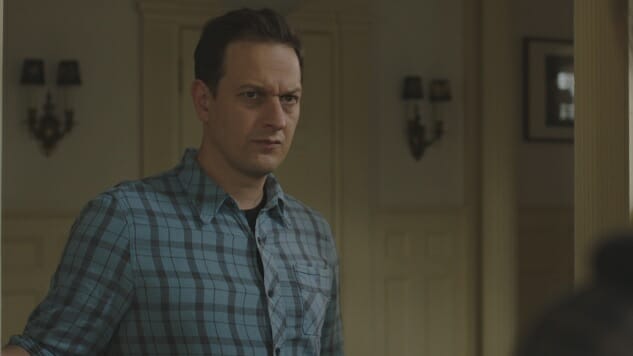Bette Gordon’s The Drowning is a solid craft burger weighed down by one accoutrement too many, either a little too much sauce or an unnecessary dash of spice, depending on what you like on your patties. Gordon has the essentials down: Workmanship, performances, suspense, an element of ambiguity. But she’s directing from the efforts of others, including Pat Barker, author of the original novel the film is based on, and screenwriters Stephen Molton and Frank Pugliese, whose work on the page is over-sufficient and overstuffed all at once. They’re good, and so is the script. You’ll just wish they’d left a couple ingredients out of the finished product before sending it out for commercial consumption.
Talking about those ingredients feels like dirty pool; we don’t get to taste them until later on in The Drowning’s psychological drama. Boiled down to the basics, we’re talking about an indiscretion of the romantic persuasion and a bit of character backstory, but the specifics don’t really matter. What matters is that they don’t pay off. In fact, you could cut them out of the film entirely without drastically altering its genes. That’s because Gordon gives it good bones. The Drowning works in spite of its stumbles, which is, perhaps, faint praise: The stumbles aren’t all that bad, just distracting at best, puzzling at worst. You’ll wonder why Molton and Pugliese thought to include them, why it never occurred to them to cut both elements wholesale, or why Gordon allowed them to trip up her film during production. They’re obvious instances of filler.
C’est la vie. Maybe Gordon has a longer cut in her back pocket, or maybe Molton and Pugliese just wrote a flabby script. None of it stops The Drowning from being enjoyable, fie upon its familiarity. A movie that makes you want to rewatch Primal Fear is hardly a movie worth hating, after all, and The Drowning has a touch more polish than Gregory Hoblit’s 1996 chiller, in which Edward Norton convinces a hotshot Chicago defense attorney of his innocence in the vicious slaying of a local Archbishop. It’s also more grounded, focused on the domestic and marital dynamics of Lauren (Julia Stiles) and Tom Seymour (Josh Charles), a long married Connecticut couple working on their first kid and balancing their separate professional, personal lives. Lauren is a publicist in the art world, and a talented artist in her own right. Tom is a psychiatrist. They’re an average Connecticut couple, in other words, until they stumble upon a man attempting suicide by (surprise!) drowning. Tom leaps into action, and their lives upend.
The man is Ian Wilkinson, real name Danny Miller (Avan Jogia), one of Tom’s former patients. As a child, Danny murdered a relative, and based in part on Tom’s testimony was sent away to juvie, where his life grew exponentially crappier by the day. The Drowning is set eleven years after the killing, and as an adult, Danny wants to get his life back on track. Or maybe he’s after revenge. His motivations never crystallize, and that’s the source of the film’s tension. Tom, in true thriller fashion, grows increasingly paranoid as Danny insinuates himself in Tom’s life, a contagion of sorts, taking over his thoughts, occupying his very being. We don’t know what is it is that Danny’s after. We just know the impact his sudden appearance has on Tom, and also on his relationship with Lauren.
The Drowning is a film of small, visceral pleasures—its ambiguity is absolutely delicious—but most of its weight rests on Charles, a man seemingly born to play uptight dudes who look as if they’re experiencing fits of intestinal discomfort at all times. Tom isn’t a pill, really, just a bore. His trouble is that his past has caught up to his present, and if he’s guilty of no wrongdoing, he still has to confront the consequences of judgments he made about another person’s life. Charles plays Tom’s crisis of conscience by suggesting burden: His posture demonstrates effort, like the very act of being upright saps him of vitality. He’s exactly the sort of actor you’d want centering a picture like this, relatable and imperfect in ways that emphasize drama. Lauren, for example, is kept in the dark about Danny’s identity. As Danny targets her, laying on his stalkery charm, Tom scolds her for interacting with him, and comes out looking like a dick in the process.
If only he could just tell Lauren the truth. The Drowning is, in many ways, a film about male insularity: It’s only easy for men to open up about what’s going on in their minds in theory, and in practice proves a Sisyphean feat. If Gordon had made more of that quiet, recursive detail, The Drowning would feel more essential, less disposable, but maybe no more watchable. The film’s problem has nothing to do with engagement and everything to do with durability. It’s unlikely to stick with you once the credits start to roll, and shouldn’t a film about memory, about bygone times and the fallout of actions taken have a little bit more staying power?
Director: Bette Gordon
Writer: Stephen Molton, Frank Pugliese
Starring: Josh Charles, Julia Stiles, Avan Jogia, Tracie Thoms, Leo Fitzpatrick, John C. McGinley, Mike Houston
Release Date: May 10, 2017
Boston-based critic Andy Crump has been writing about film and television online since 2009, and has been contributing to Paste Magazine since 2013. He writes additional words for The Playlist and Birth. Movies. Death., and is a member of the Online Film Critics Society and the Boston Online Film Critics Association. You can follow him on Twitter and find his collected writing at his personal blog. He is composed of roughly 65% craft beer.
